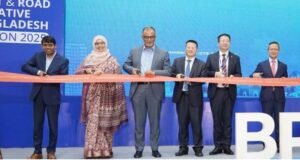
In a major initiative, Bangladesh on Monday formally announced its Indo-Pacific Outlook, which envisages a free, open, peaceful, secure, and inclusive Indo-Pacific for the shared prosperity for all.
Being a littoral State of the Bay of Bengal, Bangladesh considers the stability and prosperity in the Indo-Pacific to be a crucial factor in realizing her “Vision 2041’ — building a modern, knowledge-based developed country by 2041.
Speaking at a press briefing ahead of Prime Minister Sheikh Hasina’s three-nation tour to Japan, USA and UK beginning today (April 25), State Minister for Foreign Affairs Md. Shahriar Alam readout the Indo-Pacific Outlook held at the Ministry of Foreign Affairs on Monday afternoon.
Foreign Minister AK Abdul Momen also addressed the press conference in which he highlighted detail about the PM’s visit.
It may be mentioned that Bangladesh formally joined China’s flagship “One Belt One Road” Initiative on October 14, 2016 during Chinese President Xi Jinping’s visit to Dhaka.
While reading out the Indo Pacific Outlook, Shahriar Alam said the Indo-Pacific area’s collective share in global GDP, preponderance in international trade, enhanced climate action and growing technological dynamism can be key determinants for ensuring Bangladesh’s long-term resilience and prosperity.
“Bangladesh, therefore, envisions a free, open, peaceful, secure, and inclusive Indo-Pacific for the shared prosperity for all.”
Guiding Principles:
a. Father of the Nation Bangabandhu Sheikh MujiburRahman’s foreign policy dictum ‘Friendship towards all, malice toward none.’
b. Constitutional mandate on the conduct of international relations based on the principles of respect for national sovereignty and equality, political independence, non-interference in internal affairs, peaceful settlement of international disputes, as well as respect for international law and the principles enunciated in the United Nations Charter; and striving for renunciation of the use of force in international relations and for general and complete disarmament.
c. Adherence to the relevant UN treaties and international conventions, as applicable, including the 1982 UN Convention on the Law of the Sea (UNCLOS).
d. Constructive regional and international cooperation for sustainable development, international peace and security, humanitarian action, and fundamental rights and freedoms.
Objectives:
Consistent with the above-mentioned principles, the following objectives will guide Bangladesh’s Indo-Pacific outlook and engagements:
1. Strengthen mutual trust and respect, forge partnerships and cooperation, and promote dialogue and understanding with the aim of ensuring peace, prosperity, security and stability for all in the Indo-Pacific.
2. Strengthen existing mechanisms on maritime safety and security in the Indo-Pacific, including response to emergencies at sea and conduct of search & rescue, and uphold the exercise of freedom of navigation & over-flight, in accordance with international law and relevant international conventions, including UNCLOS, 1982.
3. Maintain meaningful and value-driven contribution to international non-proliferation, peacekeeping, peacebuilding and counter-terrorism efforts, including with partners in the Indo-Pacific.
4. Support regional and international efforts towards combating transnational organized crimes in the Indo-Pacific through both normative and practical actions.
5. Expand global lead on the flagship agenda of a ‘culture of peace’, enhance focus on the ‘women, peace and security’ agenda, promote interfaith harmony and work towards building peaceful, just and inclusive societies in the Indo-Pacific.
6. Promote open, transparent, rules-based multilateral systems that enable equitable and sustainable development in the Indo-Pacific and beyond through inclusive economic growth, right to development and shared prosperity for all.
7. Enhance physical, institutional, energy, digital and human connectivity, facilitate movement of goods, services, capital, and people in a systematic manner, and promote technology transfer, access to innovations and responsible behavior in open and secure cyberspace and outer space.
8. Leverage the domestic agriculture, manufacturing and services sectors towards building resilient regional and global value chains to better manage future crisis and disruptions and to promote unimpeded and free flow of commerce in the Indo-Pacific.
9. Promote conservation, sustainable use and management of oceans, seas, and marine resources in the Indo-Pacific in pursuance of SDG-14 and other relevant internationally agreed development commitments.
10. Engage proactively in promoting food security, water solidarity, and disaster risk reduction in the Indo-Pacific, including through disseminating home-grown good practices.
11. Continue tangible work towards addressing the challenges of climate change, biodiversity loss, marine pollution, and other significant and harmful impacts on the environment in line with relevant international conventions and commitments.
12. Foster cooperation among Indo-Pacific countries to ensure energy security for all, including through investment and technology transfer on renewable energy.
13. Work towards developing coordinated response to future pandemics and ensuring health security, including through access for all to global public goods like vaccines, diagnostics and other treatments.
14.Collaboration with sub-regional partners and relevant organizations towards bolstering regional cooperation and enhancing mutually beneficial complementarities.
15. Strengthen collaboration and cooperation in science, technology, research and innovation for shared benefits of all, in keeping with the vision of ‘Smart Bangladesh’.
 Weekly Bangla Mirror | Bangla Mirror, Bangladeshi news in UK, bangla mirror news
Weekly Bangla Mirror | Bangla Mirror, Bangladeshi news in UK, bangla mirror news







